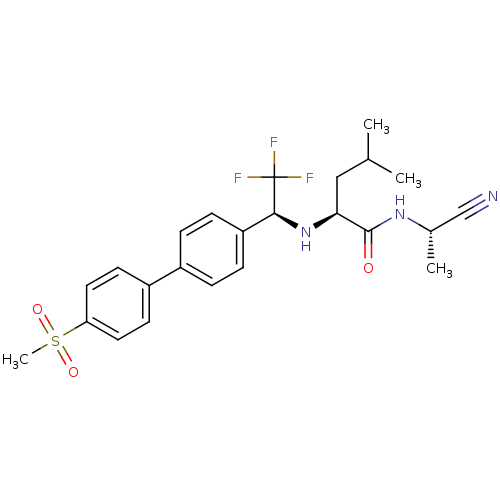

 Search and Browse
Search and Browse
 Download
Download
 Enter Data
Enter Data
| Target/Host (Institution) | Ligand | Target/Host Links | Ligand Links | Trg + Lig Links | Ki nM | ΔG° kJ/mole | IC50 nM | Kd nM | EC50/IC50 nM | koff s-1 | kon M-1s-1 | pH | Temp °C |
|---|---|---|---|---|---|---|---|---|---|---|---|---|---|
| Cathepsin K (Homo sapiens (Human)) | BDBM50214540 ((S)-4-methyl-2-[(S)-2,2,2-trifluoro-1-(4'-methanes...) | PDB MMDB Reactome pathway KEGG UniProtKB/SwissProt B.MOAD DrugBank antibodypedia GoogleScholar AffyNet | CHEMBL PC cid PC sid UniChem Similars | Article PubMed | n/a | n/a | 0.900 | n/a | n/a | n/a | n/a | n/a | n/a |
Merck Frosst Centre for Therapeutic Research Curated by ChEMBL | Assay Description Inhibition of humanized rabbit cathepsin K | Bioorg Med Chem Lett 17: 4328-32 (2007) Article DOI: 10.1016/j.bmcl.2007.05.024 BindingDB Entry DOI: 10.7270/Q2TQ618K | |||||||||||
| More data for this Ligand-Target Pair | |||||||||||||
| Cathepsin K (Homo sapiens (Human)) | BDBM50214540 ((S)-4-methyl-2-[(S)-2,2,2-trifluoro-1-(4'-methanes...) | PDB MMDB Reactome pathway KEGG UniProtKB/SwissProt B.MOAD DrugBank antibodypedia GoogleScholar AffyNet | CHEMBL PC cid PC sid UniChem Similars | Article PubMed | n/a | n/a | 1.20 | n/a | n/a | n/a | n/a | n/a | n/a |
Merck Frosst Centre for Therapeutic Research Curated by ChEMBL | Assay Description Inhibition of humanized rabbit cathepsin K | Bioorg Med Chem Lett 18: 923-8 (2008) Article DOI: 10.1016/j.bmcl.2007.12.047 BindingDB Entry DOI: 10.7270/Q21J9BM2 | |||||||||||
| More data for this Ligand-Target Pair | |||||||||||||